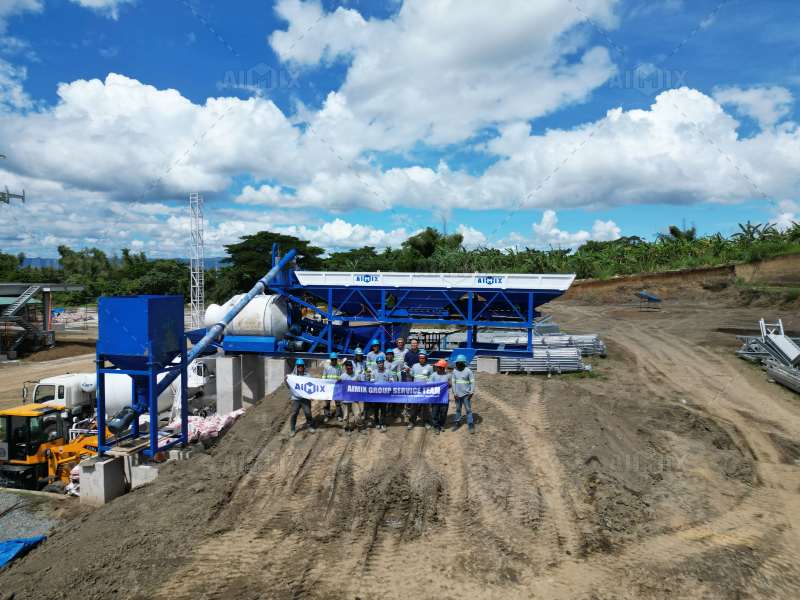Struggling with tight schedules or remote site challenges? A portable concrete batching plant is the solution. Designed for projects from small residential builds to large infrastructure works, it offers quick setup, easy mobility, and reliable concrete supply—helping users save time, minimize delays, and keep operations running efficiently.

Comparing Different Portable Batching Plant Models: Features and Capacity
When comparing portable batching plant models, Aimix offers three main options: the AJSY series with compact design, the AJZY drum-type series for cost-effective mixing, and the AJY series with flexible capacity for larger projects.
AJY Series Portable Concrete Batching Plant
Our AJY Series portable concrete batching plant combines high mobility and versatility with a production capacity of 60–120 m³/h, making it ideal for projects of varying scales. The popular models are AJY60 and AJY90.
Key Features:
AJSY Series Portable Batch Plant
Aimix AJSY compact portable concrete batch plant offers stable quality, smart weighing, easy operation and fault alerts, ensuring efficient and hassle-free concrete production. The best-selling models are AJSY20 and AJSY40.

Core Advantages:
AJZY Drum Type Concrete Portable Plant
Our AJZY drum type batching plants are ideal for C30 and below concrete projects, such as road repairs, residential buildings, and other civil works where concrete flowability is important but high volume is not required. The Popular models include AJZY40 and AJZY60.

Key Features:
Efficient Drum MixerPerfectly suited for mixing highly fluid plastic concrete, ensuring uniform quality for every batch.
Compact, Integrated DesignThe all-in-one structure allows for quick relocation without the need for a foundation, reducing downtime during site transfers.
High Mobility & Low CostEasily moved between sites, significantly lowering project costs while maintaining flexible operations.
Job Site Stories: Portable Concrete Batch Plants in Operation
Construction projects often face challenges such as strict deadlines, limited space, and tough site conditions. Our portable batching plants provide an effective solution, helping projects run smoothly and finish on time. As a trusted partner of Fortune Global 500 companies, we have worked with clients worldwide. Take a look at the following project cases for reference when considering a portable plant for your business.

AJZY-50 Portable Concrete Plant for Sale in Indonesia
- Delivery time: June 2025
- Application: For warehouse construction project
- Customer needs: The customer required an on-site concrete production solution to cut costs and gain better control over quality and delivery, instead of relying on external suppliers.
- Our solution: We provided a tailored one-stop solution with all the essential equipment for on-site concrete production, including the AJZY50 drum-type portable batching plant, a self-loading mixer, an excavator, and a wheel loader.

AJSY-35 Portable Batch Plant for Sale in Malaysia
- Delivery time: July 2025
- Application: For Roadbed Paving
- Customer needs: The client needed a portable batching plant that could be relocated quickly and start production in a short time frame.
- Our solution: We recommended our AJSY35 mixing plant featuring compact design and fast setup capability.
- Results: Even though the site had limited space and difficult terrain, the AJSY35 was installed and ready for production in just 10 days. It is now running efficiently on the job site, and the customer is very satisfied with its performance.

AJY-60 Concrete Portable Batch Plant Working in Ethiopia
- Delivery time: March 2025
- Application: For Houses Construction Projects
- Customer needs: The client required a dependable solution to accelerate batching, maintain a consistent concrete supply, and keep several real estate projects on track.
- Our solution: We supplied the AJY60 portable concrete batch plant with a 1m³ Sicoma mixer, delivering fast mixing cycles and stable output quality. Thanks to its compact, modular design, the plant can be quickly relocated between job sites.
- Results: Quick batching, steady material supply, and timely project delivery.
How Portable Concrete Batching Plants Support Rural and Remote Construction Sites

Constructing in rural or remote locations can be difficult because of limited access to materials, rough terrain, and a lack of permanent concrete facilities. Portable concrete batching plants address these challenges by enabling users to mix fresh concrete on-site, saving time and reducing transportation costs.
Mobility for Hard-to-Reach Locations
- Portable concrete batching plants can be transported easily to remote construction sites using trucks or trailers.
- Quick setup ensures a steady supply of fresh concrete, eliminating delays caused by long-distance transportation from stationary concrete plants.
- This mobility is especially useful for projects that move between multiple rural locations.
Compact Design for Limited Spaces
- The portable batch plants have a small footprint, making them suitable for sites with limited or irregular space.
- They can be installed on temporary or confined areas such as rural road projects, small bridges, and off-grid housing developments.
- Compact design also reduces the need for additional infrastructure and site preparation.
Adjustable Production to Match Project Needs
- Concrete output can be customized based on project scale, from small community projects to medium-sized construction works.
- This flexibility prevents overproduction and reduces material waste, ensuring efficient use of cement, aggregates, and water.
- Concrete producers can quickly scale production up or down as project demands change.
Cost-Effective Solution for Remote Projects
- Producing concrete on-site lowers transportation and logistics costs significantly.
- Small contractors and local authorities benefit from lower upfront investment compared to stationary plants.
- Overall, portable plants improve project profitability while maintaining quality concrete supply.
Easy Operation and Maintenance
- Simple and smart control systems allow the teams to operate the batching plant with basic training.
- Routine maintenance is minimal and straightforward, ensuring consistent performance even in locations with limited technical support.
- Reduced downtime helps keep projects on schedule.
Faster Project Completion
- Reliable on-site concrete production accelerates construction timelines.
- Projects such as rural roads, bridges, and community facilities can be completed faster and more efficiently.
- Portable concrete plants support multiple sites without the need to build permanent infrastructure.
Understanding the advantages in challenging sites helps clarify the key factors to consider when selecting a portable plant. The following guide outlines how to choose the right model for long-term project performance.
Making the Right Choice: Portable Concrete Plant Selection for Long-Term Performance

Selecting the right portable concrete plant is an important step for contractors and construction companies. To make a smart decision, buyers should carefully consider project requirements, mobility, technology, and cost.
Assessing Project Scale and Concrete Output Requirements
Every project has different demands. Smaller projects, such as residential housing or rural road work, may only require a compact plant with moderate output. In contrast, some infrastructure projects need higher-capacity portable batching plants to guarantee continuous production. Choosing a plant that matches the project’s scale prevents both underuse and unnecessary investment.
Mobility Features and On-Site Setup Efficiency
A key advantage of a portable plant is its flexibility. For companies working on multiple sites, it’s important to have equipment that’s easy to move and set up. Modular designs and quick-installation systems minimize downtime, allowing projects to start faster—especially important for time-sensitive work.
Advanced Technology and Automation for Consistent Quality
Concrete quality depends largely on plant technology. Modern concrete portable plants with digital control systems provide accurate weighing, mixing, and monitoring. Automation minimizes errors, ensures consistent batches, and boosts efficiency. For example, our AJSY compact plant features an innovative smart wireless remote, allowing a single operator to control the entire plant.
Balancing Portable Concrete Plant Cost with Long-Term Value
While price is always a key factor, buyers should look beyond the initial purchase. A cheaper plant may lead to higher maintenance expenses and lower efficiency. In many cases, investing in a reliable, energy-efficient model delivers greater long-term returns. Considering the entire lifecycle cost is essential to achieve the best value.
Once you know how to select a suitable plant, it’s important to understand how portable models compare with stationary batching plants. This comparison highlights differences in capacity, cost, and operational flexibility.
Portable vs Stationary Batching Plants: Key Differences Explained
 |
 |
 |
|---|
| Key Aspect | Portable Batching Plant | Stationary Batching Plant |
|---|---|---|
| Mobility | Designed for easy transport and relocation; ideal for temporary or remote sites | Fixed installation; designed for long-term, single-location projects |
| Installation Time | Fast setup, usually 1–3 days | Longer setup, often 2–4 weeks including foundation and commissioning |
| Production Capacity | Moderate, typically 20–90 m³/h | High, typically 60–180 m³/h, suitable for large-scale projects |
| Footprint | Compact (200–400 m²), minimal space required | Larger (500–1200 m²), requires more site space |
| Cost | Lower initial investment ($50,000–$150,000 or more), saves on transport | Higher initial investment ($150,000–$500,000 or more), cost-effective long-term |
| Concrete Quality | Consistent quality for small to medium projects; automated mixing possible | High-quality output; supports high-strength and specialty concrete with advanced automation |
| Ideal Use | Small to medium projects, temporary sites, remote locations | Large-scale infrastructure, long-term commercial or industrial projects |
| Advantages | Flexible, quick to deploy, lower operating cost | Stable, high-capacity, suitable for continuous high-volume production |
After comparing plant types, practical operation and maintenance tips are essential to ensure consistent performance and extend the lifespan of your plant.
4 Essential Tips to Keep Your Portable Concrete Plant Running Smoothly
To keep a portable batching plant performing at its best and producing consistent concrete, users should follow four key practices: correct setup, routine maintenance, skilled operation, and quality monitoring.
01Prepare the Site Correctly
Before installation, make sure the protable concrete batching plant is placed on a stable, level foundation with good drainage. Clear debris and allow easy access for trucks and raw materials. A well-prepared site prevents disruptions and supports continuous production.
02Perform Regular Maintenance
Routine equipment checks are essential to avoid costly breakdowns. Inspect mixers, conveyors, and mechanical systems frequently. Lubricate moving parts and replace worn components promptly. Proactive maintenance extends plant life and ensures consistent concrete output.
03Train and Support Operators
Operators play a crucial role in plant efficiency. Proper training on mixing procedures, control systems, and safety protocols helps them reduce errors, ensure accurate batching, and quickly adapt to new technologies, boosting overall productivity.
04Monitor Quality Consistently
High-quality concrete is critical for project success. Test batches regularly for slump, strength, and uniformity. Use automated systems or checklists to identify problems early. Strong quality monitoring reduces waste and guarantees reliable results.
Future Development Trends of Portable Concrete Batching Plants

Automation and Smart Control Systems
Portable concrete batching plants are moving towards fully automated systems with advanced software for precise measurement of cement, aggregates, water, and additives. Remote monitoring and real-time data tracking improve production efficiency and concrete quality.
Enhanced Mobility and Modular Design
Future plants will emphasize faster setup and easy relocation. Modular components, lighter frames, and minimal foundation requirements allow users to move the plant quickly between sites, making it ideal for remote, temporary, or urban projects.
Energy Efficiency and Sustainability
Environmental concerns are driving energy-saving designs. New plants incorporate low-energy motors, water recycling, waste reduction, and eco-friendly mixing technologies, lowering operational costs and meeting stricter environmental regulations.
Adaptation to Modern Construction Materials
Portable concrete plants are increasingly designed to handle specialized concrete mixes, including high-strength, lightweight, and recycled aggregate concrete. This adaptability aligns with evolving construction standards and green building trends.
Investing in our portable concrete plant secures long-term advantages, offering reliable operation, minimal downtime, and the flexibility to adapt to changing project needs. With high-quality construction, easy mobility, and expert support, partner with Aimix today to enhance your project’s efficiency, reduce costs, and achieve a strong return on investment for years to come.





